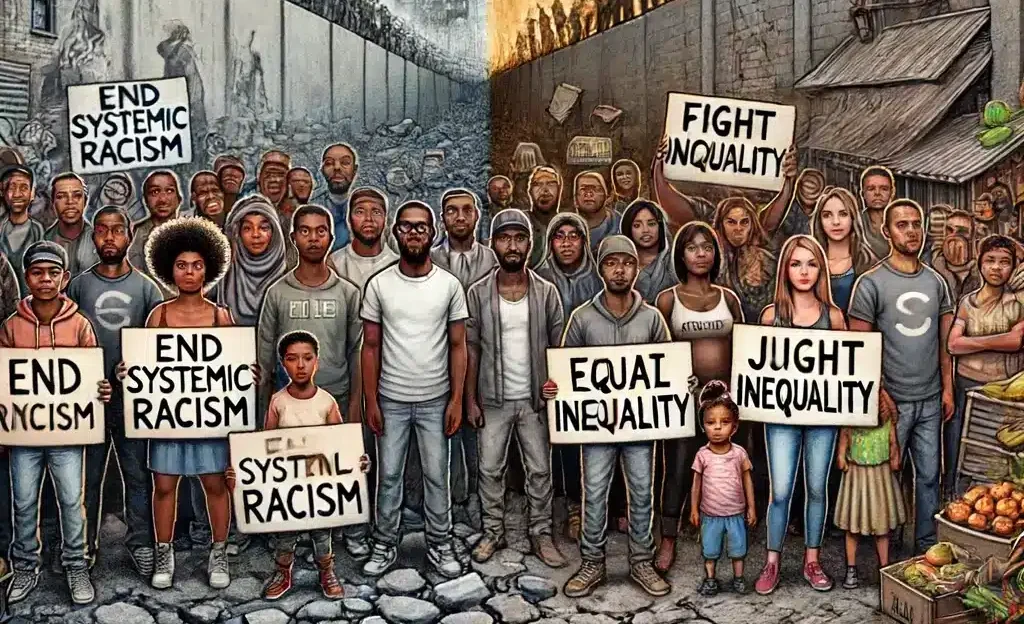Systemic Racism – From Prejudice to Permanent Guilt
The Shift in Definition
Racism once meant individual prejudice — treating people unfairly because of their skin colour. Today, the term has been expanded into systemic racism: the claim that racism is built into every institution, law, and cultural norm.
The shift changes everything. If racism is no longer about attitudes or actions but the very structure of society, then the only solution is constant activism, permanent reform, and endless guilt.
Table of contents
What Is Systemic Racism?
In activist theory, systemic racism means racism isn’t an individual problem but a social system that advantages some groups and disadvantages others.
- A law that applies equally but produces unequal outcomes? Systemic racism.
- A workplace with fewer minorities in senior roles? Systemic racism.
- Test results that differ between groups? Systemic racism.
In this framework, outcomes are the evidence. If disparities exist, racism is assumed — no further proof needed.
Buzzwords of Systemic Racism
The narrative is reinforced through familiar terms:
- “White privilege” – Invisible advantages held by white people.
- “Unconscious bias” – Racism exists even if you don’t realise it.
- “Equity” – Equal rules aren’t enough; results must be managed.
- “Structural oppression” – The claim that every institution is built to disadvantage minorities.
Together, these terms create a worldview where racism is not an exception but the default.
How Systemic Racism Shows Up in Practice
- In Education: Curricula reframed through Critical Race Theory, teaching children that racism is baked into every institution.
- In Law: Hate speech and bias laws expanded to police behaviour and language.
- In Workplaces: Mandatory training sessions on unconscious bias and privilege.
- In Politics: Policies designed around racial quotas, reparations, or “equity frameworks.”
Systemic racism turns from theory into bureaucracy — a set of policies and trainings that never end.
Why Politicians and Institutions Promote It
- Politicians use it to justify sweeping policies and new spending.
- Corporations adopt the language to signal virtue and protect brands.
- Universities entrench it in research, conferences, and courses.
- NGOs mobilise it to attract donations and influence global policy.
Systemic racism provides a permanent narrative of injustice — and a permanent role for those managing it.
The Consequences of the Systemic Racism Framework
- Guilt as Policy: People are judged by group identity, not individual behaviour.
- Division: Communities are pitted against each other, fuelling resentment.
- Silenced Debate: Disagreement with the framework is labelled proof of racism.
- Distraction: Class and economic inequality are buried under racial categories.
Ironically, a theory meant to reduce prejudice often ends up entrenching division.
Why It Matters
Systemic racism has become the lens through which many institutions now view society. But by redefining racism as permanent, it ensures the fight can never end. Every disparity becomes evidence of oppression, every policy becomes a moral crusade, and every citizen is measured by identity.
The result isn’t less racism, but more bureaucracy, more division, and less space for genuine dialogue.
Conclusion: From Problem to Permanent Industry
Racism is real — but systemic racism reframes it as everywhere, always, and forever. That shift has built an industry of consultants, activists, and politicians who live off the narrative.
The irony? A concept designed to fight prejudice often locks society into permanent suspicion. Instead of building bridges, it builds paperwork.
FAQ: Systemic Racism
What does systemic racism mean?
It’s the theory that racism is built into all institutions and cultural norms, not just individual attitudes.
Why is it controversial?
Because it assumes inequality must always be caused by racism, ignoring other factors like class, education, or economics.
How is systemic racism applied in practice?
Through bias training, equity policies, quotas, and new laws around hate speech and privilege.
Who promotes the idea of systemic racism?
Politicians, universities, NGOs, and corporations that benefit from framing society as permanently unjust.
What’s the risk of this framework?
It entrenches division, silences dissent, and builds endless bureaucracy instead of solving real problems.



